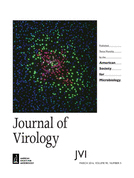- EN - English
- CN - 中文
Infectious Subviral Particle-induced Hemolysis Assay for Mammalian Orthoreovirus
哺乳动物正呼肠孤病毒传染性亚病毒颗粒诱导的溶血试验
发布: 2018年01月20日第8卷第2期 DOI: 10.21769/BioProtoc.2701 浏览次数: 6191
评审: Yannick DebingKristin ShinglerSmita Nair

相关实验方案

诱导型HIV-1库削减检测(HIVRRA):用于评估外周血单个核细胞中HIV-1潜伏库清除策略毒性与效力的快速敏感方法
Jade Jansen [...] Neeltje A. Kootstra
2025年07月20日 2460 阅读
Abstract
Mammalian orthoreovirus (reovirus) utilizes pore forming peptides to penetrate host cell membranes. This step is essential for delivering its genome containing core particle during viral entry. This protocol describes an in vitro assay for measuring reovirus-induced pore formation.
Keywords: Virology (病毒学)Background
Reoviruses are nonenveloped, double-stranded RNA viruses that are composed of two concentric protein shells: the inner capsid (core) and the outer capsid (Dryden et al., 1993; Zhang et al., 2005; Dermody et al., 2013). Following attachment, virions are endocytosed (Borsa et al., 1979; Ehrlich et al., 2004; Maginnis et al., 2006; Maginnis et al., 2008) and host cathepsin proteases degrade the σ3 outer capsid protein (Chang and Zweerink, 1971; Silverstein et al., 1972; Borsa et al., 1981; Sturzenbecker et al., 1987; Dermody et al., 1993; Baer and Dermody, 1997; Ebert et al., 2002). This process generates a metastable intermediate, called infectious subviral particle (ISVP), in which the cell penetration protein, µ1, is exposed (Dryden et al., 1993). Reovirus ISVPs undergo a second conformational change to deposit the genome- containing core into the host cell cytoplasm. The altered particle is called ISVP* (Chandran et al., 2002). ISVP-to-ISVP* conversion culminates in the release of µ1-derived pore forming peptides (Nibert et al., 1991; Zhang et al., 2005; Chandran et al., 2002; Odegard et al., 2004; Nibert et al., 2005; Agosto et al., 2006; Ivanovic et al., 2008). The released peptides form pores within endosomal membranes, which are thought to mediate core delivery (Agosto et al., 2006; Ivanovic et al., 2008; Zhang et al., 2009).
Many of the conformational changes that define reovirus entry can be recapitulated in vitro: (i) ISVPs are produced by digesting purified virions with chymotrypsin (Joklik, 1972; Borsa et al., 1973a), and (ii) ISVP* formation can be induced using heat (Middleton et al., 2002), large monovalent cations (Borsa et al., 1973b), µ1-derived peptides (Agosto et al., 2008), red blood cells (Chandran et al., 2002; Sarkar and Danthi, 2010), or lipids (Snyder and Danthi, 2015 and 2016). Thus, questions related to reovirus entry are studied using biochemical and cell-based approaches. In this protocol, we describe an in vitro assay that recapitulates ISVP-to-ISVP* conversion and subsequent pore formation.
Materials and Reagents
- Pipette tips
- PCR 8-well tube strips (VWR, catalog number: 20170-004 )
- 50 ml centrifuge tube (VWR, catalog number: 89039-660 )
- 1.7 ml microcentrifuge tubes (MIDSCI, catalog number: AVSS1700 )
- Vacuum driven and disposable bottle top 0.22 µm filter (Merck, catalog number: SCGPT05RE )
- Flat bottom, 96-well plate (Greiner Bio One International, catalog number: 655180 )
- Purified reovirus stocks (see Berard and Coombs, 2009; Kobayashi et al., 2010 for propagation and purification procedures)
- Crushed ice
- Standard SDS-PAGE materials and reagents (e.g., 10% SDS-polyacrylamide mini gels)
- Coomassie Brilliant Blue stain and destain solutions (Bio-Rad Laboratories, catalog number: 1610435 )
- Citrated bovine calf blood (Colorado Serum Company, catalog number: 31023 )
- Bleach (Biz4USA, Janitorial Supplies, catalog number: CLO30966CT )
- 2-Amino-2-(hydroxymethyl)-1,3-propanediol (Tris) (MP Biomedicals, catalog number: 02103133 )
- Sodium chloride (NaCl) (Merck, catalog number: SX0420-3 )
- 0.1 N hydrochloric acid (Sigma-Aldrich, catalog number: 2104 )
- 0.1 N sodium hydroxide (Sigma-Aldrich, catalog number: 2105 )
- Nα-p-tosyl-L-lysine chloromethyl ketone (TLCK)-treated chymotrypsin (Worthington Biochemical, catalog number: LS001432 )
- Phenylmethylsulfonyl fluoride (PMSF) (Sigma-Aldrich, catalog number: P7626 )
- Isopropyl alcohol (Avantor Performance Materials, Macron, catalog number: 3032-02 )
- Dulbecco’s phosphate buffered saline (Thermo Fisher Scientific, GibcoTM, catalog number: 21600044 )
- Magnesium chloride hexahydrate (MgCl2·6H2O) (Sigma-Aldrich, catalog number: M9272 )
- Ultrapure DNase/RNase-free distilled H2O (Thermo Fisher Scientific, InvitrogenTM, catalog number: 10977015 )
- Triton X-100 (TX-100) (Sigma-Aldrich, catalog number: X100 )
- 50% bleach (see Recipes)
- Virus storage buffer (VB) (see Recipes)
- 2 mg/ml TLCK-treated chymotrypsin (see Recipes)
- 100 mM phenylmethylsulfonyl fluoride (PMSF) (see Recipes)
- Phosphate buffered saline supplemented with 2 mM MgCl2 (PBSMg) (see Recipes)
- 10% Triton X-100 (TX-100) (see Recipes)
Equipment
- Personal protective equipment (PPE)
- Laboratory coat
- Gloves
- Eye protection
- Laboratory coat
- Biosafety level 2 (BSL-2) laboratory facility
- BSL-2 certified tissue culture hood
- Solid and liquid waste containers
- Autoclave
- Vacuum pump and aspirator
- Ice bucket
- -20 °C freezer
- Micropipettes
- 0.1-2.5 µl capacity (Eppendorf, catalog number: 3123000012 )
- 2-20 µl capacity (Eppendorf, catalog number: 3123000039 )
- 20-200 µl capacity (Eppendorf, catalog number: 3123000055 )
- 100-1,000 µl capacity (Eppendorf, catalog number: 3123000063 )
- 0.1-2.5 µl capacity (Eppendorf, catalog number: 3123000012 )
- Digital pH meter (VWR, model: SB70P )
- Digital laboratory balance (Mettler Toledo, model: PB1502-S )
- NanoDrop spectrophotometer (Thermo Fisher Scientific, Thermo ScientificTM, model: ND-1000 )
- Hot plate stirrer (VWR, catalog number: 12365-382 )
- Magnetic stir bar (VWR, catalog number: 58948-273 )
- Microcentrifuge (Eppendorf, model: 5424 )
- Thermal cycler (Bio-Rad Laboratories, model: S1000TM )
- Temperature controlled water bath (VWR, catalog number: 89501-466 )
- Gel imaging system (LI-COR, model: Odyssey® Classic )
- Microplate reader (Molecular Devices, model: FilterMax F5 Multi-Mode )
- 250 ml glass beaker (VWR, catalog number: 89000-204 )
- 1,000 ml glass beaker (VWR, catalog number: 89000-212 )
- 100 ml graduated cylinder (VWR, catalog number: 65000-006 )
- 1,000 ml graduated cylinder (VWR, catalog number: 65000-012 )
- 100 ml storage bottle (VWR, catalog number: 89000-234 )
- 1,000 ml storage bottle (VWR, catalog number: 89000-240 )
Note: This product has been discontinued.
Software
- Image Studio Lite (LI-COR)
- SoftMax Pro (Molecular Devices)
Procedure
文章信息
版权信息
© 2018 The Authors; exclusive licensee Bio-protocol LLC.
如何引用
Snyder, A. J. and Danthi, P. (2018). Infectious Subviral Particle-induced Hemolysis Assay for Mammalian Orthoreovirus. Bio-protocol 8(2): e2701. DOI: 10.21769/BioProtoc.2701.
分类
微生物学 > 微生物-宿主相互作用 > 病毒
生物化学 > 蛋白质 > 活性
您对这篇实验方法有问题吗?
在此处发布您的问题,我们将邀请本文作者来回答。同时,我们会将您的问题发布到Bio-protocol Exchange,以便寻求社区成员的帮助。
Share
Bluesky
X
Copy link











